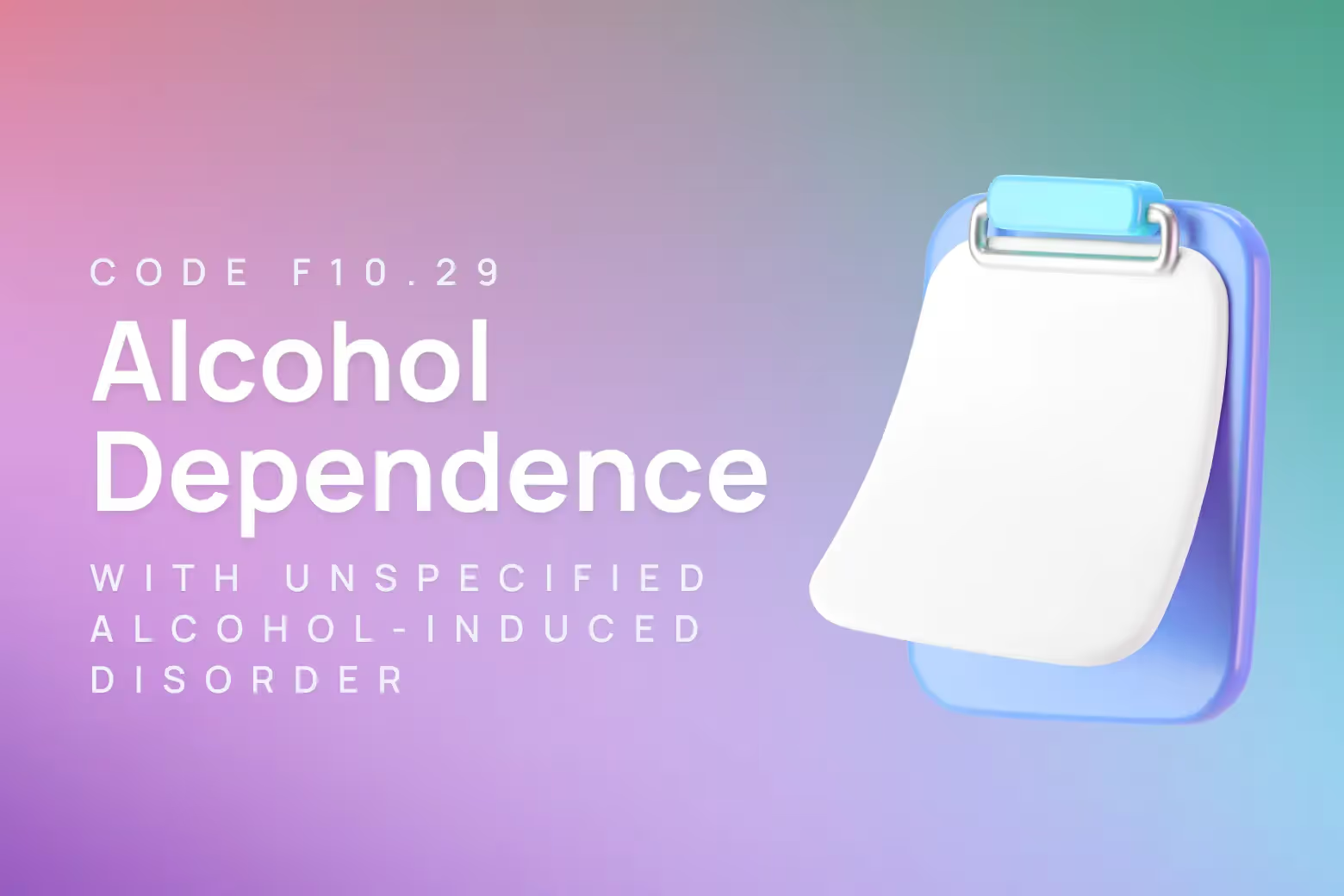ICD-10 code for alcohol use, unspecified, with alcohol-induced persisting amnestic disorder

F10.96 is the ICD-10 code for alcohol use, unspecified, with alcohol-induced persisting amnestic disorder.
This diagnostic code represents severe alcohol-related cognitive impairment characterized by persistent memory dysfunction.
Accurate diagnosis of this condition is crucial for implementing appropriate treatment and supporting long-term recovery.
Key features:
- Persistent memory impairment resulting from chronic alcohol use
- Often irreversible cognitive deficits affecting new learning capacity
- Most severe form includes Wernicke-Korsakoff syndrome
- Requires comprehensive assessment to rule out other causes of cognitive decline

Diagnostic criteria for alcohol-induced persisting amnestic disorder (F10.96)
The development of significant memory impairment represents one of the most serious consequences of prolonged alcohol use.
This condition emerges from the combined effects of alcohol neurotoxicity and thiamine deficiency.
Clinicians must establish clear evidence that memory dysfunction developed during or shortly after periods of heavy alcohol consumption.
The cognitive impairment persists beyond typical intoxication or withdrawal periods.
Key diagnostic requirements include:
- Development of memory impairment as evidenced by impaired ability to learn new information or inability to recall previously learned information
- Memory disturbance causes clinically significant impairment in social, occupational, or other important areas of functioning
- Memory deficits do not occur exclusively during delirium and persist beyond typical alcohol intoxication or withdrawal
- Evidence from history, physical examination, or laboratory findings that memory deficits are related to persisting effects of alcohol use
- Disturbance is not better accounted for by another mental disorder
When to use F10.96 diagnosis code
Understanding when to apply this specific diagnostic code requires careful consideration of the patient's presentation and alcohol use history.
The "unspecified" designation indicates that the severity of alcohol use disorder is not specifically coded here.
F10.96 vs F10.97 (Alcohol use, unspecified, with alcohol-induced persisting dementia)
While both codes represent severe alcohol-related cognitive impairment, they capture different patterns of dysfunction.
F10.96 primarily affects memory formation and recall, whereas F10.97 involves broader cognitive decline affecting multiple domains including executive function, language, and visuospatial abilities.
Amnestic disorder typically presents with preserved immediate recall but severe deficits in forming new memories.
Patients may demonstrate intact social skills and reasoning abilities while showing profound inability to remember recent events or learn new information.
F10.96 vs F10.99 (Alcohol use, unspecified, with unspecified alcohol-induced disorder)
F10.99 serves as a catch-all code for alcohol-related conditions that don't meet criteria for more specific diagnoses.
F10.96 requires clear documentation of persistent memory impairment that significantly impacts daily functioning.
The key distinction lies in the specificity and severity of symptoms. F10.96 demands evidence of substantial memory dysfunction that persists well beyond acute alcohol effects, while F10.99 may encompass milder or less well-defined alcohol-related problems.
Related ICD-10 codes
- F10.97 Alcohol use, unspecified, with alcohol-induced persisting dementia
- F10.99 Alcohol use, unspecified, with unspecified alcohol-induced disorder
- F10.10 Alcohol use disorder, mild
- F10.20 Alcohol use disorder, moderate or severe
Interventions and CPT codes for alcohol-induced persisting amnestic disorder
Comprehensive diagnostic evaluation
Initial assessment requires thorough evaluation to establish the diagnosis and rule out other causes of cognitive impairment.
This includes detailed alcohol use history, cognitive screening, and medical workup.
The diagnostic evaluation typically uses 90791 for the comprehensive psychiatric diagnostic evaluation.
This initial assessment establishes the alcohol-related diagnosis and develops the treatment plan.
Individual cognitive rehabilitation therapy
Cognitive rehabilitation focuses on teaching compensatory strategies and working within the patient's preserved abilities.
Treatment adapts to cognitive limitations while building on remaining strengths.
Individual therapy sessions use standard psychotherapy codes based on session duration:
- 90832 for 30-minute sessions
- 90834 for 45-minute sessions
- 90837 for 60-minute sessions
Structured environmental interventions
Environmental modifications play a crucial role in supporting patients with persistent memory impairment.
Treatment emphasizes routine, structure, and external memory aids.
These interventions are billed using the same individual psychotherapy codes, as the focus remains on therapeutic skill-building and adaptation strategies.
Family education and support
Family involvement becomes essential when cognitive impairment affects daily functioning. Education helps family members understand the condition and develop appropriate support strategies.
Family therapy billing depends on patient participation:
- 90846 for family therapy without patient present
- 90847 for family therapy with patient present
Alcohol screening and brief intervention
For patients with ongoing alcohol use, screening and brief intervention remain important components of care.
Screening and brief intervention codes include:
- 99408 for 15-30 minutes of structured screening and brief intervention
- 99409 for interventions lasting more than 30 minutes
- 96127 for brief behavioral assessment per standardized instrument
How Upheal improves F10.96 ICD-10 documentation
Suggesting appropriate ICD-10 codes based on session content
Clinical documentation for alcohol-induced persisting amnestic disorder requires careful attention to cognitive symptoms and functional impairments.
Upheal's clinical documentation platform analyzes session content to identify key diagnostic indicators and suggest appropriate coding.
The platform recognizes patterns in clinical notes that point toward persistent memory dysfunction versus other alcohol-related conditions.
This helps ensure accurate diagnostic coding while reducing documentation burden.
Maintaining HIPAA-compliant records with proper diagnostic coding
Proper documentation of cognitive impairment requires detailed notes about memory testing, functional assessment, and treatment planning.
Upheal maintains secure, compliant records while capturing essential clinical information.
The platform helps track cognitive changes over time, supporting treatment decisions and billing accuracy.
This longitudinal perspective proves valuable for documenting treatment progress and justifying continued care.
Reducing administrative burden so you can focus on client care
Working with patients who have persistent memory impairment demands significant clinical attention and patience.
Administrative tasks can detract from the focused care these clients require.
Upheal automates routine documentation tasks, allowing clinicians to concentrate on developing compensatory strategies and supporting both patients and families through challenging circumstances.
Supporting clients with alcohol-induced persisting amnestic disorder
The journey of caring for individuals with alcohol-induced persisting amnestic disorder requires patience, creativity, and realistic expectations.
While some memory function may improve with sustained abstinence, many patients face permanent cognitive changes that affect their daily lives.
Treatment focuses on maximizing remaining abilities while developing practical strategies for managing memory deficits.
Success often means helping patients and families adapt to a new reality rather than restoring previous functioning.
Effective care requires collaboration between multiple disciplines and consistent use of evidence-based interventions adapted for cognitive limitations.
Modern clinical documentation tools like Upheal help ensure that the complex needs of these patients receive proper attention and support.
Today's healthcare providers benefit from documentation platforms that understand the unique challenges of treating alcohol-related cognitive disorders.
Try Upheal free to experience how intelligent clinical documentation can help you provide better care while maintaining accurate records for this complex patient population.













